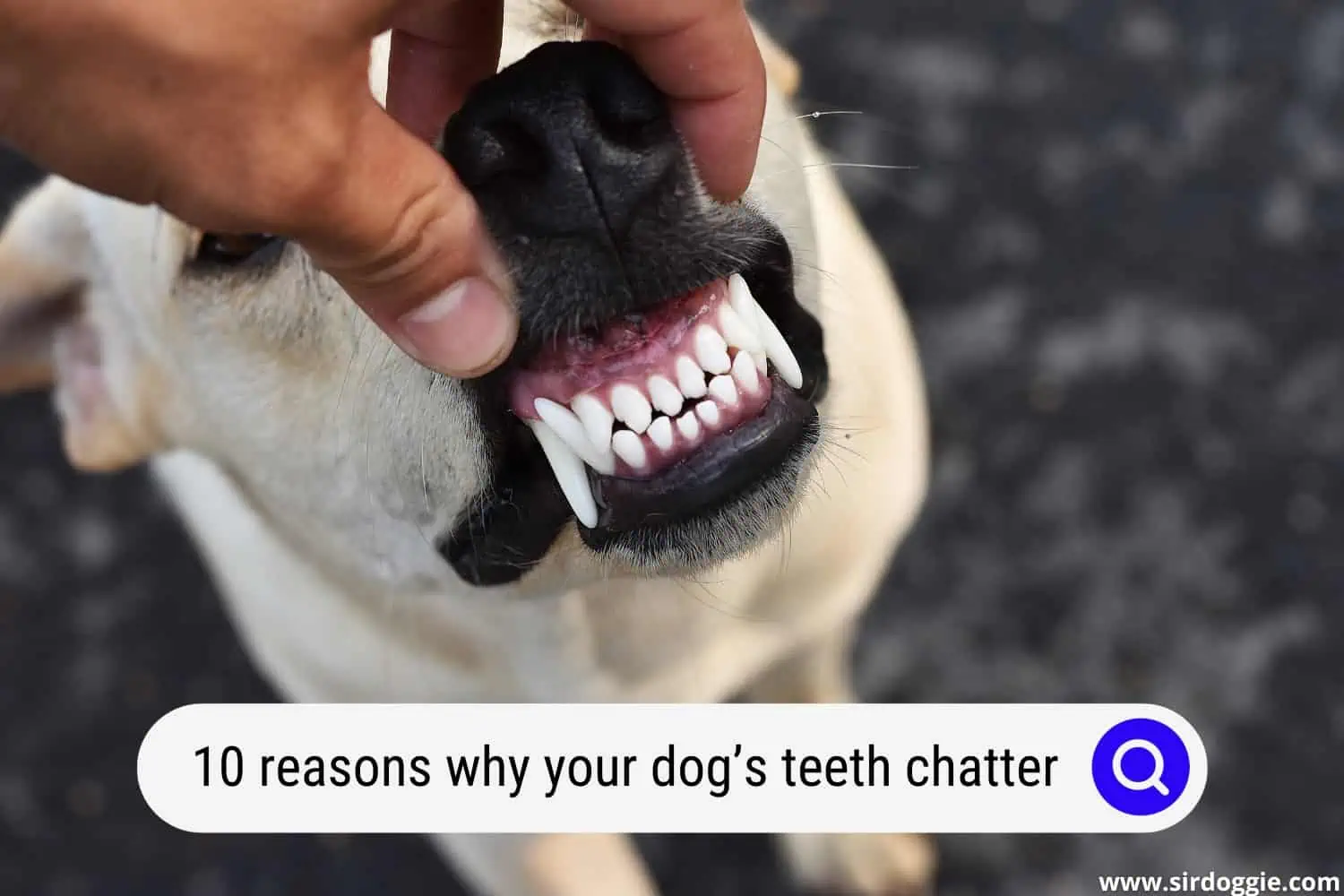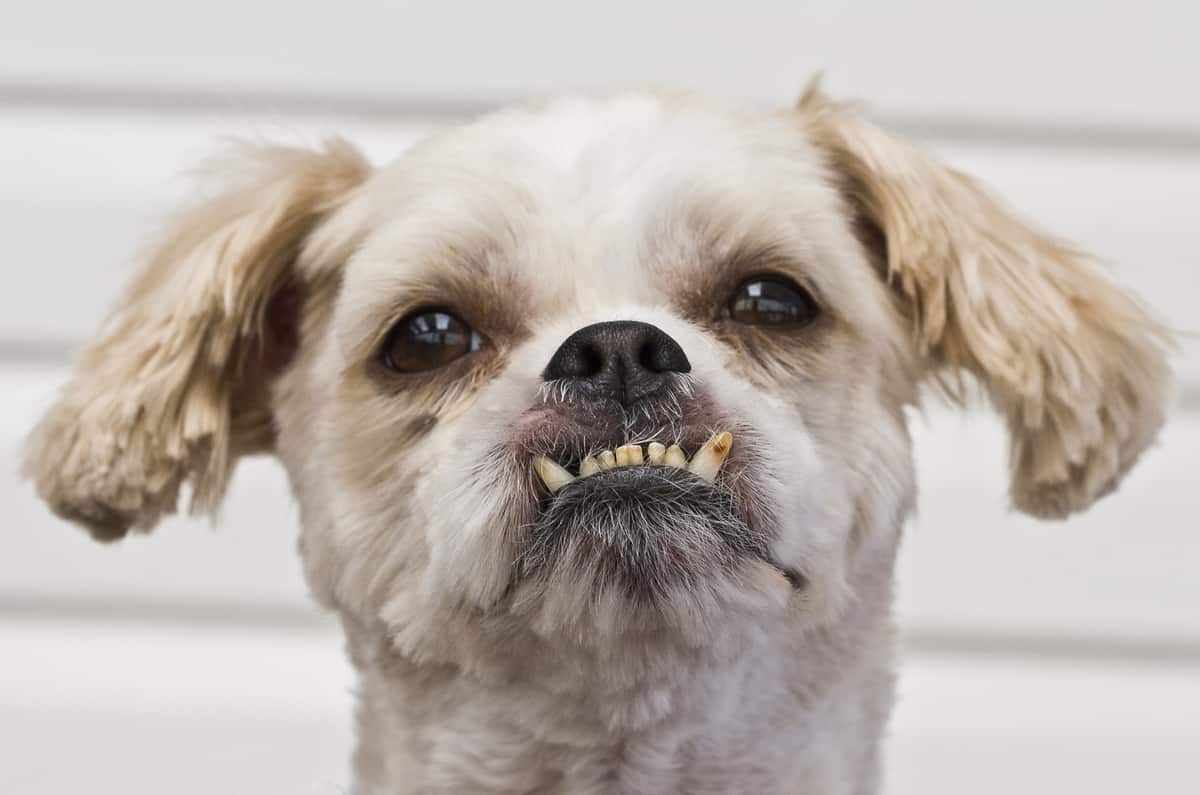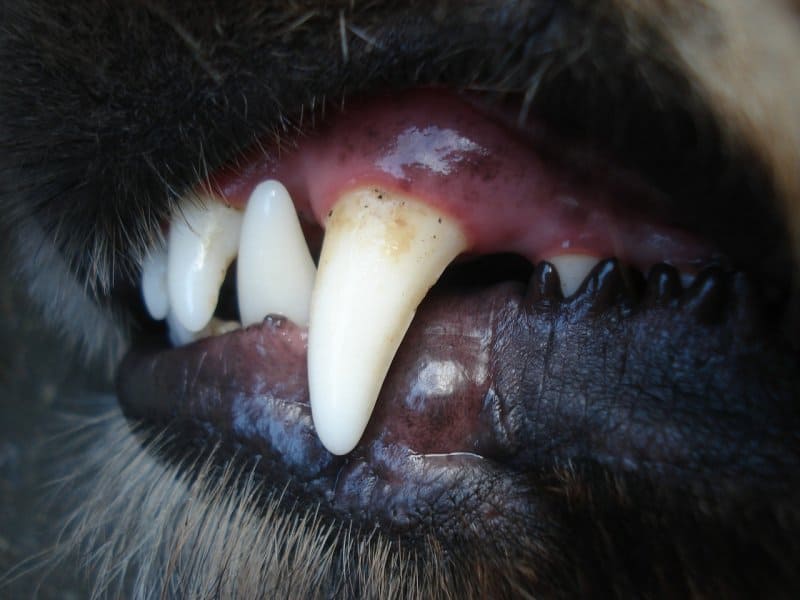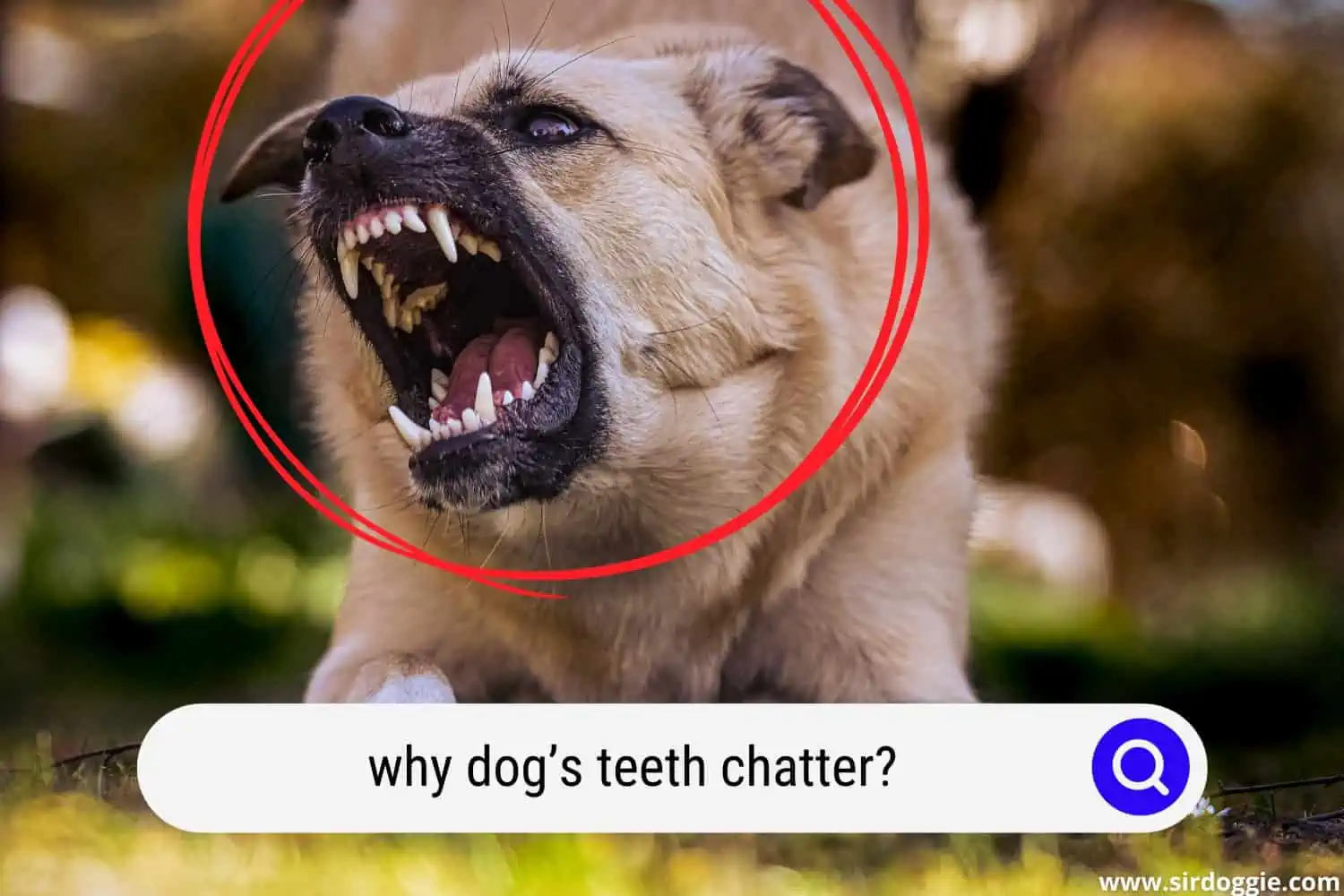10 Reasons Why Your Dog’s Teeth Chatter, And How To Help
Dog teeth chattering could be as simple as chill, over-excitement, anxiety, or a more serious condition. You might observe this behavior in your dog when it is nervous or excited.

Your dogs may chatter their teeth if excited by a new ball, or they are nervous about a new visitor.
However, the most common cause of chattering is oral pain. This means your pooch may have problems with their gums and teeth. If your dog’s teeth chattering is a new and consistent behavior, always get them checked over by a vet.
Here are 10 reasons why a dog’s teeth chatter:
- Your dog is feeling threatened
- Your dog is experiencing pain or distress
- Your dog is feeling happy and excited
- Your dog is feeling cold
- Neurological disorder
- Underlying Health Issues
- Dental conditions
- Scent collection
- Old age
- Anxiety and stress
Usually, teeth chattering is often associated with the sensation of feeling cold. For your four-legged friends, it is true in some cases. It is a bit of strange and funny behavior in dogs.
Teeth chattering can be a symptom of many underlying medical conditions and emotions. It is not a breed-specific tendency. Any dog, irrespective of the breed, can exhibit this behavior.
You need to know the reasons why your dog’s teeth chatter. This will help you to better understand when to ignore these teeth chattering and when to take your furry pal to a vet.
Related Reading: Why Do Dogs Lick Each Other’s Teeth?
Why Are My Dog’s Teeth Chattering?
Let’s find out more about why dogs’ teeth chatter and possible reasons for your dog’s teeth chattering.
1. Your dog is feeling threatened
For dogs, teeth chattering is a subtle way of communication. They usually do it when they feel threatened by other dogs. This type of communication is also called displacement language.
When dogs come across a threat, they may start chattering their teeth to stay calm and ward off potential threats. The sound of chattering teeth can distract a threatening dog, by diverting its attention to comprehending the sound.
It also helps the threatened dog to stay calm. Displacement language is one of the incredible survival instincts in dogs. Alongside teeth chattering, your dog may also start licking the face and spinning in circles as a form of displacement language.
2. Your dog is experiencing pain or distress
Dogs may start teeth chattering to express that they are in pain. The dog might be experiencing other bodily pain, teeth chattering becomes a way of communicating frustration or distress.
It becomes a way for dogs to vent their unpleasant emotions. For example, teeth chattering exhibits that your dog is feeling pain somewhere you can’t see, possibly pain from going upstairs.
Your dog may start teeth chattering to display emotional distress. Dogs may start teeth chattering to get rid of their negative energy and frustrations.

3. Your dog is feeling happy and excited
Teeth chattering can also be a sign of happiness and excitement. Many dogs chatter their teeth because they are excited and are experiencing pure joy. Your dog might chatter their teeth when they anticipate something good and excited like:
- They might be expecting a delicious treat
- They might be expecting their favorite toy
- They are about to be fed
- Their owner comes home after a long day and they are super excited about that
- In the middle of an exciting play session
- They just licked or smelled something great during a walk
It’s not uncommon for dogs to start chattering their teeth when they get excited. They also exhibit this behavior when they are overjoyed and must express it somehow. In such cases, there is nothing to worry about. This impulsive behavior is due to something positive.
4. Your dog is feeling cold
Just like humans, if your furry friend is cold, their teeth may chatter. Some dog breeds have a low tolerance for cold weather. This is especially prevalent with toy breeds or short-haired dogs that live in cold climates.
Your dog’s teeth may start chattering when it is shivering from a cold or is having a fever. If this is the case, you might notice some accompanying symptoms including:
- Shivering or shaking
- Cold ears
- Extreme lethargy or sleepiness
- Whining or barking
- Change in behavior, like seeming anxious or uncomfortable
- Seeking areas of shelter
- Lifts paws off the ground
Try to do as much as you can to make your dog feel better. Here’s what you should do:
- Bring your furry pal inside in a warm and cozy place
- Give your dog rest on a heating pad or cozy bed
- Invest in a sweater to keep your dog warm during the colder weather
- Give your furry pal warm fresh water to drink and stay hydrated
- Feed warm chicken soup to your dog
- If your dog is also having a fever, you might need a vet visit
During cold weather, try to keep an eye on how your dog behaves. If the cold is left untreated, your dog might develop a much bigger issue.
5. Your dog is experiencing a neurological disorder
Your dog may be having neurological problems, such as seizures. Some of these problems might cause teeth and jaw chattering. Some neurological conditions, such as the late stages of distemper, may cause your dog to chatter its teeth.
A neurological disorder in dogs can often be healed, cured, or managed. However, there are some for which there is no cure. In such cases, you have to understand and cope with the approaching loss of your furry pal.
6. Underlying Health Issues
It’s important to pay attention to the frequency of your dog’s teeth chattering, and the various situations in which this behavior occurs. In some cases, teeth chattering can point to a health issue that requires medical attention.
Teeth chattering can surface as a symptom of several different health conditions, including periodontal disease, epilepsy, and neurological degeneration. If you are concerned your dog is experiencing any of these health issues, it is important to see your vet.
- Facial motor seizures: This condition affects the jaws only. It’s also very brief, so it can be difficult to spot if you’re not watching your dog closely. Essentially, it causes the jaws to tighten up for a brief period. This results in chattering.
- Multisystem Neuronal Degeneration: Also known as the “shaker syndrome” Multisystem Neuronal Degeneration causes the body to tremble. It also leads to balance issues among dogs. It’s a hereditary issue that usually affects Cocker Spaniel, Maltese, and Bichon Frise breeds.
- Epilepsy: These seizures will cause the teeth to chatter. This is also accompanied by intense drooling and foaming from the mouth. It’s an alarming condition that should be taken seriously.
7. Dental conditions
Canines with dental problems and pain in their mouth can chatter their teeth. In such cases, teeth chattering is a sign of oral pain. Dog teeth chattering happens
- Your dog may chatter as a response to the pain from a tooth abscess or gum infection.
- During puppyhood, the little furbaby may be teething and may also chatter its teeth.
- Fractured teeth and exposed nerves can also cause oral pain and teeth chattering in dogs.
- Teeth chattering is also caused by advanced periodontal disease causes significant pain for dogs. This is a gum disease where bacteria grows in small gaps between your dog’s gums and teeth.
Dog teeth chattering caused by dental illness is accompanied by excessive drooling and reluctance to eat. These dogs stop playing with chew toys and might show resistance to letting you examine their mouth.
8. Scent collection
Dogs’ sense of smell is much stronger than ours. They have 60 times as many scent receptors as humans. This often results in teeth chattering.
Odor detection and scent collection are important parts of a dog’s life. Your canine pals have a secondary scent collection system in their mouths. These impressive sniffers have a special organ “vomeronasal” that gives dogs the power to taste smells.
Sometimes, your dog’s teeth chattering might be a reaction to a particular taste or smell. They may chatter their teeth when they love the taste or smell of something and become over-excited.
Occasionally, when a dog licks something gross, it may start teeth chattering. This is usually just an impulsive reaction and nothing dangerous.
9. Old age
Dogs can start chattering their teeth as they get older. This behavior is more common in senior dogs. Many older dogs suffer from neurological disorders and start chattering their teeth.
These disorders are accompanied by drooping of the eyelids, nostrils, and lips.
Teeth chattering begins to affect dogs of any breed and size as they reach a certain age. You need to observe when your dog starts teeth chattering. Understanding why your dog chatters their teeth can help you make things less damaging.
10. Anxiety and stress
Teeth chattering is a signal for anxiety, stress, and nervousness. Dogs often knock their teeth together before or after a stressful event.
Sometimes, your dog chatter when it is suffering from separation anxiety. You may notice this when you leave for work. It’s their way of expressing emotional discomfort.
In such cases, it is important to first manage your dog’s anxiety that is causing teeth chattering.
If your furry friend has natural nervous tendencies, it may likely chatter its teeth. Your dog might start teeth chattering around new people or in new environments. The chattering can become a coping mechanism to keep your dog calm.
It’s usually an involuntary action that helps the dog focus their emotions.
Pet Parent Tip: It is recommended to check your dog’s teeth and mouth regularly. This helps you to determine any potential risks and take preventive measures timely.
Is chattering of a dog’s teeth dangerous?
So, is it dangerous? Well, normally, the chattering of teeth is not dangerous. However, some of them may require your immediate attention. Occasionally, teeth chattering may signal something more serious.
What to do about dog teeth chattering?
In most cases, dog teeth chattering is nothing to worry about. It is an unusual behavior as compared to other things your dog may do. However, dog teeth chattering may carry several different implications. You need to keep a watchful eye on your dog when their teeth chatter. You should observe the situations where it starts occurring.
You should be very careful when it comes to your dog’s health. If teeth chattering becomes a regular behavior, you should discuss this with the vet.
There are many conditions that can cause teeth chattering. It’s better to record a short video of your dog chattering so that your vet can see the behavior in action.
When should you visit a vet?
If your dog’s teeth chattering happens regularly, make a vet appointment. He will help you determine or rule out any potential health issues. Your vet will be able to thoroughly examine your dog’s teeth and gums to look for any signs of fractures or disease.
Your vet will likely ask you questions about your dog’s behavior over the last few weeks. Any unusual behavior like excessive drooling, avoiding eating, or playing with toys can signal mouth pain.
Equally, a foul odor or blood coming from the mouth can also signify a problem.

How Does a Dog’s Teeth Sound When They Chatter?
The sound of teeth chattering is not very loud in dogs. In fact, the dog’s chattering teeth don’t sound as pronounced as human teeth do.
A dog’s chattering teeth can be heard as a low, rattling hum emanates from its mouth.
This teeth-chattering could be accompanied by a quivering jaw.
The teeth-chattering noise is often quite short-lived. By the time you look at your dog, it has already stopped. Teeth chattering should not be confused with air snapping.
In dogs, air snapping is a behavior seen when they open and close their mouth as if biting the air.
How to look after your dog’s teeth
Your dog’s teeth and jaws have a lot of work to do. They are used for more than just eating and chewing food. A dog uses its mouth and teeth to play, chew its favorite toys, and explore the surrounding areas.
Since dog teeth chattering is often caused by tooth pain, it’s vital to maintain good dental hygiene. If you don’t take care of your furry friend’s teeth, they can start to cause problems.
Regular brushing is by far the most effective way to prevent dental problems in dogs.
Brush your dog’s teeth two to three times per week to maintain good oral health. Use toothpaste specifically designed for canines, as human toothpaste can be harmful to dogs.
Regular brushing will help to:
- Remove bacteria and tartar buildup
- Prevent inflammation of the gums and other gum diseases
- Prevent painful cavities
- Protect teeth from becoming loose and falling out
- Keep breath fresh
Alongside brushing, there are other ways to help keep your dog’s teeth clean and healthy:
- Dental chews: Giving your dog dental chews can also help reduce plaque. If you decide to use dental chews, make sure you get the correct size for your dog. And since dental chews are high in calories, you should adjust your dog’s normal food intake so they don’t gain weight.
- Kibble: Kibble or dry dog food is a natural abrasive and can help to maintain good dental health.
- Enzymatic products: You can add these products to your dog’s water bowl. Enzymatic products claim to fight bad breath and plaque build-up.
Pet Parent Tip: Avoid giving hard chews, cooked bones, and stones to your dogs. They can wear down or break teeth.
It’s always best to talk to your vet and get recommendations.

Final thoughts
Whenever you hear that teeth chattering noise from your dog, make sure you pay attention to it. Observe when and where it’s happening.
Most of the time, it is harmless and simply a sign that your dog is chilly. If you notice anything suspicious, you need to visit your vet. He will help ease your worries and make your dog comfortable.
Does your furry friend chatter its teeth? What are the circumstances in which your dog’s teeth start chattering? Let us know in the comments.

Family Dog Expert Author
Hi there! I’m Stuart, a devoted dog lover and family dog expert with over a decade of experience working with our furry companions. My passion for dogs drives me to share my knowledge and expertise, helping families build strong, loving bonds with their four-legged friends. When I’m not writing for SirDoggie, you’ll find me hiking, playing with my beautiful dog, or studying music.